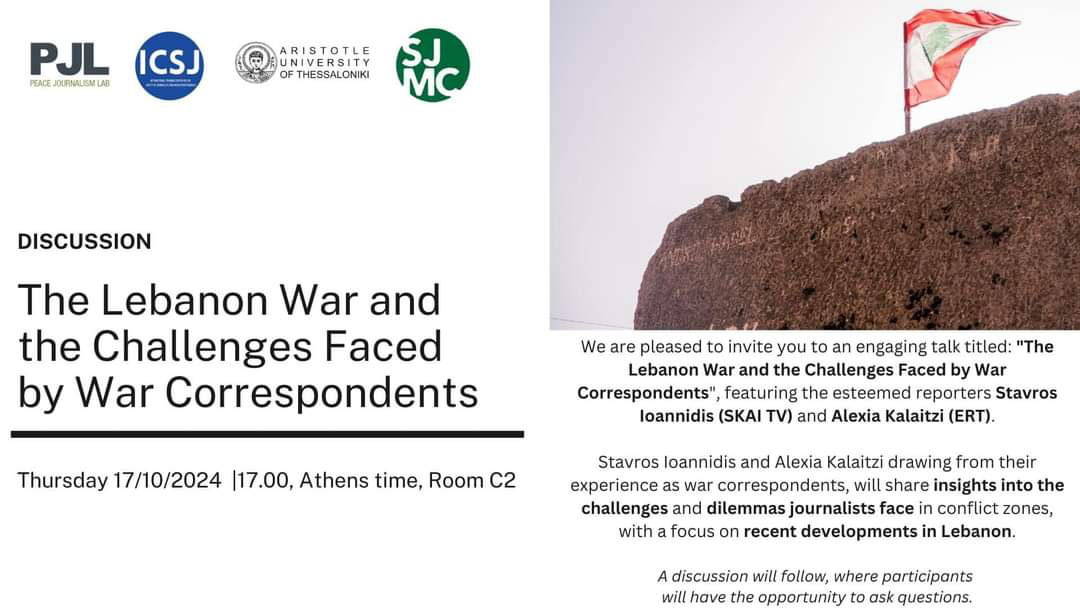On Thursday, October 17, 2024, a lecture took place at the School of Journalism and Mass Media, featuring experienced journalists Alexia Kalaitzi and Stavros Ioannidis. The topic of discussion was the war in Lebanon, a subject of great complexity and importance in the realm of international affairs, which captivated the interest of students. The event attracted a mixed audience, including students from both the Greek-speaking and the English-speaking programs of the department, highlighting the growing need for aspiring journalists to understand the challenges faced by professionals reporting from conflict zones.
Alexia Kalaitzi and Stavros Ioannidis, drawing on their extensive experience in international reporting and conflict coverage, conveyed the harsh realities of journalism in war zones. The two speakers emphasized that journalism in such environments requires not only professional integrity but also a high level of composure and ethical responsibility, as the information gathered and broadcasted significantly influences public opinion and international politics.
Following the lecture, a discussion ensued, during which students posed a variety of questions. One of the most interesting topics raised concerned the collection of information when foreign journalists cannot have direct access to the war zone. The speakers explained that, in such cases, they rely on local journalists and sources, with whom they establish close relationships of trust. They also highlighted the challenges associated with using local sources, as objectivity can be affected by the political and social realities faced by these individuals.
Another critical question from the students addressed the efforts journalists make to maintain balance and objectivity in their reporting from such extreme environments. Alexia Kalaitzi stressed that while objectivity is a fundamental principle, it is not always easy to uphold. The exposure to horrific events and the pressure from opposing sides in the conflict can create a risk for journalistic integrity. However, both Kalaitzi and Ioannidis underscored the importance of critical thinking and verifying information before publication, with the goal of providing a comprehensive and as balanced an account as possible.
The mental health of journalists was another important issue raised by the audience. Students expressed strong interest in how professionals handle the traumatic stimuli and emotional impact resulting from covering conflicts. Stavros Ioannidis explained that while journalists are trained to remain calm and professional, the images and experiences from war can leave deep psychological scars. He emphasized the need for psychological support, as well as the importance of maintaining a healthy distance from the events.
The high level of student participation in the event demonstrated the growing interest of the younger generation in international issues and modern challenges. This discussion provided a unique opportunity for students to gain valuable insights from those at the forefront of events and better understand the conditions under which journalists operate in conflict zones. The speakers highlighted the importance of independent, reliable journalism in a world constantly tested by conflicts and political uncertainty, and encouraged young journalists to continue investigating these critical issues with integrity and passion
At the close of the event, Kostas Tsironis, a photojournalist with extensive experience in covering crises, particularly environmental ones, was invited to the podium. Among other things, Kostas Tsironis emphasized the importance of building relationships of trust and mutual respect with individuals and organizations involved in such situations. He also highlighted the critical role of physical safety measures for those covering crises, underlining how essential it is to remain protected while on the ground. Moreover, he shared how his personal experiences in diverse and challenging work environments helped him develop skills in empathy, as well as in managing people and situations during times of crisis.




